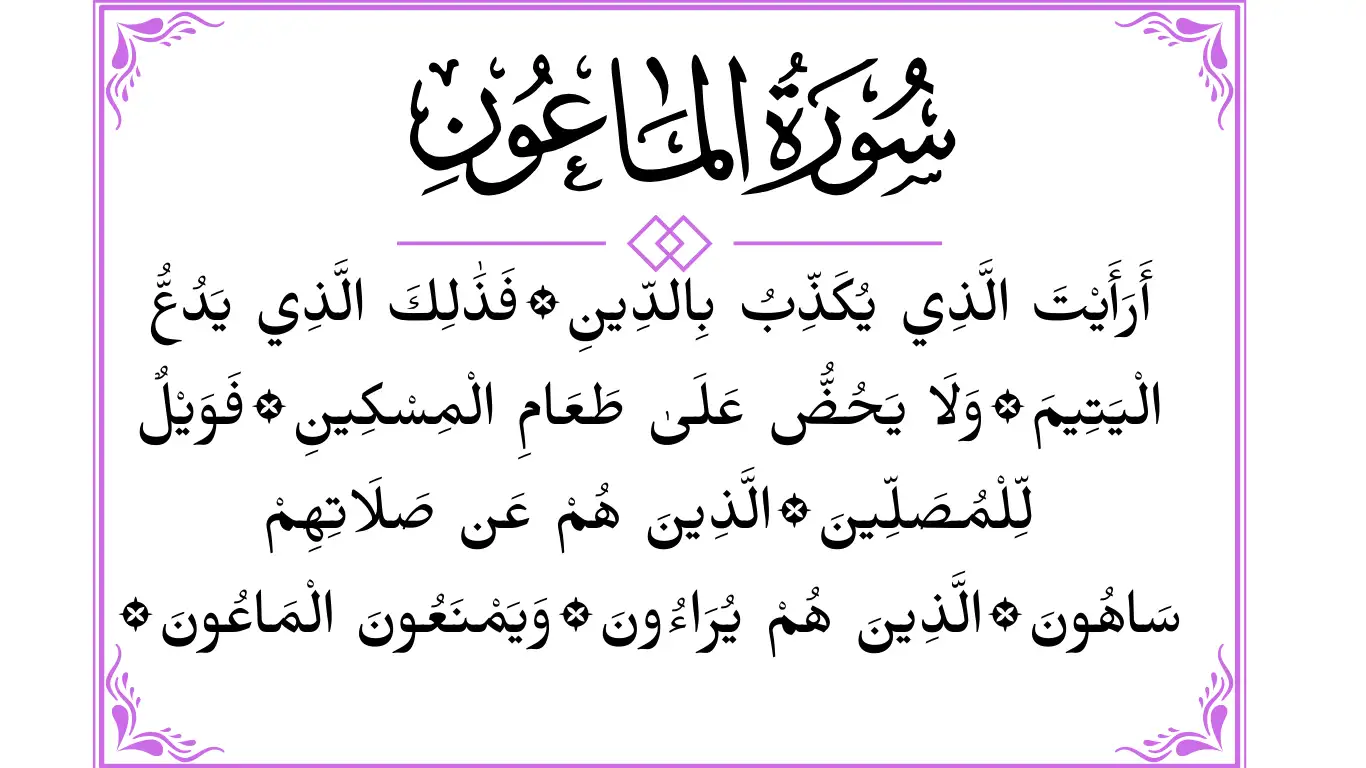Introduction
Surah Al-Maun (سورة الماعون), the 107th chapter of the Quran, is a profound Makki Surah known by its opening phrase Surah Araital Lazi (أرأيت الذي). Despite its brevity, it delivers a piercing critique of hypocrisy and challenges believers to align worship with compassion. This guide unpacks its verses, themes, and actionable lessons for today’s world.
Surah al Maun: Arabic Text, Transliteration & Translation
Verse 1: Denying Accountability
Arabic: أَرَأَيْتَ الَّذِي يُكَذِّبُ بِالدِّينِ
Transliteration: Ara’aitalladhi yukadhdhibu biddin
Translation: “Have you seen the one who denies the Reckoning?”
Key Insight: The verse targets those rejecting the Day of Judgment—a cornerstone of Islamic ethics. Without belief in divine accountability, moral responsibility crumbles.
Verse 2: Cruelty to Orphans
Arabic: فَذَٰلِكَ الَّذِي يَدُعُّ الْيَتِيمَ
Transliteration: Fadhalika alladhi yadu‘‘u alyatim
Translation: “For that is the one who repulses the orphan.”
Key Insight: Islam mandates kindness to orphans (Quran 89:17). Repelling them exposes a lack of empathy and social duty.
Verse 3: Neglecting the Poor
Arabic: وَلَا يَحُضُّ عَلَىٰ طَعَامِ الْمِسْكِينِ
Transliteration: Wa la yahuddu ‘ala ta‘ami al-miskin
Translation: “And does not urge the feeding of the poor.”
Key Insight: Faith without charity is hollow. The Quran repeatedly links belief with feeding the needy (e.g., Surah Al-Insan 76:8-9).
Verses 4-5: Hollow Prayers
Arabic: فَوَيْلٌ لِّلْمُصَلِّينَ ﴿٤﴾ الَّذِينَ هُمْ عَن صَلَاتِهِمْ سَاهُونَ ﴿٥﴾
Transliteration: Fa waylul lil-musallin (4) Alladhina hum ‘a salatihim sahun (5)
Translation: “So woe to those who pray (4) but are heedless of their prayers (5).”
Key Insight: The warning isn’t against prayer itself but against mechanical rituals devoid of focus—prayer must nurture humility, not habit.
Verse 6-7: Hypocrisy & Stinginess
Arabic: الَّذِينَ هُمْ يُرَاءُونَ ﴿٦﴾ وَيَمْنَعُونَ الْمَاعُونَ ﴿٧﴾
Transliteration: Alladhina hum yura’un (6) Wa yamna‘unal-ma‘un (7)
Translation: “Those who pray only to be seen (6) and refuse even small kindnesses (7).”
Key Insight:
- Riya (Show-Off): Performing deeds for praise invalidates sincerity.
- Maun (Small Kindnesses): Withholding minor help (e.g., lending tools) reveals a selfish heart.
5 Timeless Lessons from Surah al Maun
- Sincerity > Rituals: Worship is valid only with pure intention (Quran 98:5).
- Protect the Vulnerable: Orphans and the poor are tests of faith (Quran 2:177).
- Charity as Worship: Feeding others is a divine act, not optional.
- Reject Hypocrisy: Faith crumbles when deeds are for social media, not Allah.
- Small Acts Matter: A smile, sharing water, or mentoring orphans—all count.
Why Is It Called “Surah Araital Lazi”?
The title derives from its opening words (“Have you seen the one who…”), highlighting its focus on exposing hypocrisy. This naming convention is common in the Quran (e.g., Surah Al-Fil).
Modern Relevance of Surah al Maun
- Social Media Hypocrisy: In an era of curated piety, the Surah urges authenticity.
- Community Building: Start food drives, orphan sponsorships, or free clinics.
- Mindful Worship: Use prayer apps with focus reminders to avoid distraction.
Conclusion: Living Surah al Maun in 2024
Surah Al-Maun isn’t just a chapter—it’s a call to transform faith into action. In a world drowning in performative piety and inequality, its message is urgent: Pray like Allah is watching, serve like the needy are family, and reject hypocrisy in all forms. Let this Surah inspire you to build a legacy of sincerity, one small act of kindness at a time.




